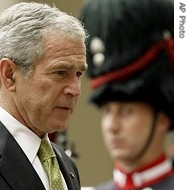-
(单词翻译:双击或拖选)
By Paula Wolfson
Rome
12 June 2008
 |
| President George W.Bush walks past honor guard upon arrival at Rome's Quirinale presidential palace, 12 Jun 2008 |
The president can expect a warm welcome from his friend, Italian Prime Minister Silvio Berlusconi, who was returned to power in elections held in April and formed a new government a few weeks ago.
Mr. Berlusconi is pushing for a bigger role in Western diplomatic efforts to convince Iran to suspend uranium enrichment. And, President Bush is expected to make an equal appeal, during their talks, for a greater Italian commitment to Afghanistan.
Mr. Bush began his day in Rome, with a meeting with Italian entrepreneurs who are involved in an exchange and training program with companies in the United States.
He praised the program and others like it, saying such exchanges promote greater understanding.
"The best diplomacy1 for America - particularly among young folks - is to welcome you to our country. You get to see first hand the truth about America," he said.
After the roundtable discussion, the president headed off to a series of meetings with Italian leaders, culminating with a working dinner with the prime minister.
Mr. Berlusconi and the president have, by all accounts, a close working relationship. The Italian leader is seen as a strong Bush ally.
But President Bush remains2 highly unpopular in Italy, mainly because of the Iraq war.
When he arrived in Rome Wednesday afternoon, protesters were already gathering3 in the city and thousands of extra police were on the streets. The demonstrators say they are protesting not only against the American president, but his allies in Rome, as well.
This man says they are demonstrating against the government of the United States and what he calls its social, military and environmental crimes around the world. He says the Italian government shares responsibility.
But such sentiments are not universal, and many Romans seem more upset about the impact the protests and the increased security are having on their everyday lives.
Many buses and trains have been rerouted, during the president's visit, and commercial flights have been banned over Rome during his stay.
By contrast, there was no sign of additional security measures during the president's earlier stops in Slovenia and Germany. There were no protests, either. One German activist4 group said there was no need to stage any demonstrations5 because President Bush has so little time left in office.
 收听单词发音
收听单词发音
1
diplomacy

|
|
| n.外交;外交手腕,交际手腕 | |
参考例句: |
|
|
|
2
remains

|
|
| n.剩余物,残留物;遗体,遗迹 | |
参考例句: |
|
|
|
3
gathering

|
|
| n.集会,聚会,聚集 | |
参考例句: |
|
|
|
4
activist

|
|
| n.活动分子,积极分子 | |
参考例句: |
|
|
|
5
demonstrations

|
|
| 证明( demonstration的名词复数 ); 表明; 表达; 游行示威 | |
参考例句: |
|
|
|















